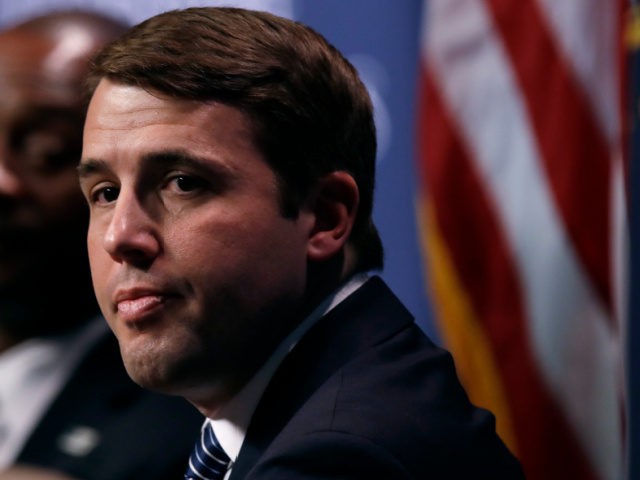A New Hampshire paper on Friday described House Democrat Rep. Chris Pappas (D-NH) as “vulnerable” heading into the 2022 midterms while Republicans gear up to oust Rep. Nancy Pelosi (D-CA) from her speakership.
“Republicans sense that U.S. Rep. Chris Pappas (an old fogey at 41) and many other Democrats will be vulnerable in 2022,” the Union Leader wrote. “It often happens that the party out of power has an edge in the off-year contests. Moreover, New Hampshire’s 1st District has been flipping so often that it has sometimes been mistaken for an Olympic acrobat.”
“Rep. Pappas’ own real world experience isn’t deep either. While involved with his family’s Manchester restaurant, he has spent much of his time working for other politicians and seeking office himself. He seems to know he is vulnerable,” the publication continued. “Judging from his press releases, he has been running for reelection since the day after the 2020 vote.”
The paper goes on to slam Pappas for contradictory pay increase policies:
Some of his fund-raising appeals border on the absurd. In one, Pappas boldly announced his opposition to a congressional pay raise. We doubt there would have been a release had he favored such. He then asked potential donors to tell him whether they are for or against such a pay increase. He might as well have added a box where donors could check “yes” for a raise for Chris Pappas and a “no” for all others.
The Union Times‘ roasting of Pappas came as the New Hampshire State Republicans are looking to flip New Hampshire’s first district from blue to red amid state redistricting, which will reportedly carve the top part of the district in such a way as to potentially benefit Republicans.
Potential congressional candidate, Matt Mowers, who narrowly lost the 2020 election to Pappas, told Breitbart News that the “only thing served by Chris Pappas’s restaurant experience is hypocrisy.”
“He supported increasing the minimum wage on other small businesses but doesn’t even pay his own employees that,” Mowers said.
He is “out of touch with any real world experiences,” which has been “shown by his blatant disregard for New Hampshire’s small business and working class families,” Mowers continued. “We need representatives who understand what it’s like to grow up in a middle class family and recognize the need to support hard working families across our country by supporting policies that create jobs, control rising inflation and keep our communities safe.”
Rising inflation is, indeed, increasingly a concern for Americans since President Joe Biden took office.
On Thursday, Celinda Lake, a pollster for the Biden 2020 campaign and who continues to advise Biden, told Axios that “Women voters,” a key demographic for Biden, “are really experiencing it, because they’re always more focused on kitchen table economics, microeconomics.”
Karoline Leavitt, 23, who is running in the Republican primary, told Breitbart News on July 23 that granite staters are looking for “conservative change” from “uncontrolled spending” and “inflation” stemming from Biden’s policies.
Leavitt said Biden’s inflation and excess unemployment money has made it difficult for businesses to find workers.
“Hiring signs are everywhere,” she said, referencing a local Wendy’s posted sign offering $13.50 per hour. “But employers can’t find workers” due to the state’s paying people more money than they would receive from a paycheck.
“On top of that, the business community is suffering from inflation because businesses are having a difficult time purchasing innovatory,” she stated.
Breitbart News reported July 14 the Producer Price Index rose 7.3 percent in June from 12 months earlier, the largest demand since 12-month data was first introduced in 2010. In comparison to May, the index rose one percent. On average during the pre-pandemic Trump administration, the index rose by around 0.2 percent per month.

COMMENTS
Please let us know if you're having issues with commenting.